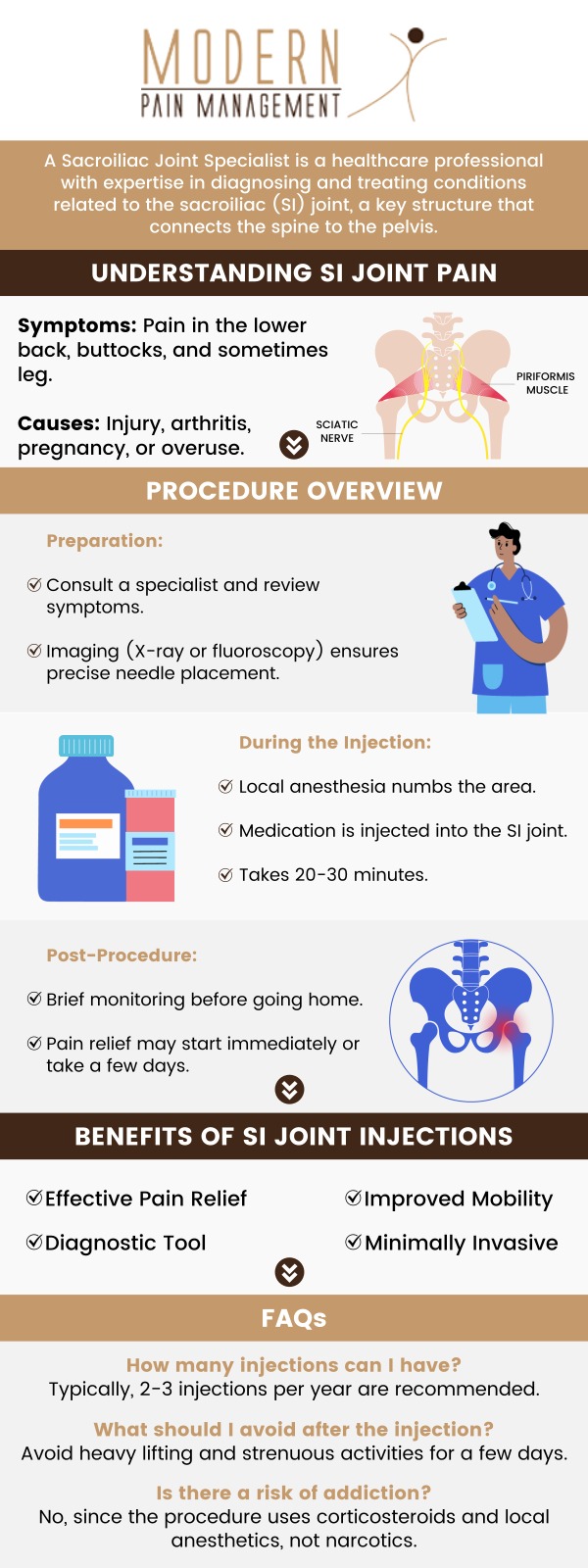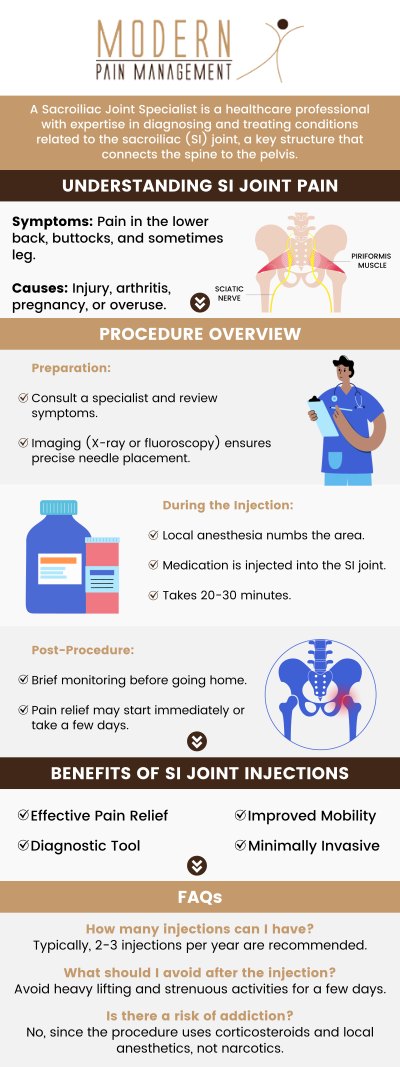Can Arthritis Cause SI Joint Pain?
Sacroiliitis, or painful inflammation of the SI joint, is a result of arthritis-related disorders. Arthritis, severe injuries, pregnancy and the postpartum period, systemic inflammatory diseases, and infections are among the possible causes of sacroiliac discomfort. Visit Dr. George Atallah, DO, and his qualified staff for sacroiliac joint pain treatment at Modern Pain Management. Contact us today or schedule a consultation. We are located at 12930 Dairy Ashford Rd #501-504, Sugar Land, TX 77478.




Table of Contents:
How do you treat an arthritic SI joint?
What are the symptoms of SI inflammation?
What are the types of arthritis that cause sacroiliac joint pain?
How can I get immediate relief from SI joint pain?
Treating an arthritic SI joint requires a strategy that is customized for each individual, considering the specific type of arthritis affecting their SI joint and other related factors. At Modern Pain Management, the treatment process begins with a comprehensive evaluation to understand the patient’s unique set of symptoms and medical history, which informs the creation of a personalized treatment plan.
This plan might include a mix of therapeutic interventions aimed at both managing the condition and mitigating the symptoms. The range of treatments employed may involve minimally invasive techniques such as therapeutic and epidural steroid injections, SI joint injections, and other advanced solutions designed for either diagnosing or addressing the pain. Alongside these interventions, physical therapies and lifestyle modifications may be recommended to support and enhance the treatment’s effectiveness.
In certain cases, radiofrequency ablation or similarly minimally invasive procedures offer sufficient relief, whereas, for more severe scenarios, surgical options could be explored.
The cornerstone of treating arthritic SI joint issues lies in the customization of the treatment plan, ensuring it aligns perfectly with the individual’s needs for the most effective outcome.
At Modern Pain Management, a wide array of minimally invasive and cutting-edge regenerative medicines are at the forefront of treating SI joint arthritis. The approach might also incorporate hands-on techniques to gently manipulate the body, providing symptomatic relief for SI joint distress.
The multifaceted treatment strategy for addressing arthritic conditions of the SI joint includes a combination of innovative medical treatments and supportive therapies, all tailored to manage symptoms effectively.
Symptoms of SI inflammation typically manifest as pain in or around the sacroiliac joints, which are crucial for linking the spine to the pelvis and facilitating a wide range of movements. The intensity and nature of SI joint pain can vary, affecting the lower back, buttocks, and even extending down the legs.
This discomfort might intensify with movement, prolonged sitting, or standing, and might be further aggravated by placing uneven weight on the legs, such as when running or climbing stairs.
The pain experienced may range from sharp and stabbing to a dull, constant ache, with stiffness often accompanying it, especially noticeable in the mornings. Symptoms indicating issues with the sacroiliac joints may include increased discomfort when more weight is placed on one leg compared to the other.
SI inflammation can significantly disrupt daily activities, as ongoing pain not only exacerbates the symptoms but also hampers an individual’s ability to lead an active lifestyle and attain restful sleep, affecting their overall physical and mental wellness.
Arthritis that leads to sacroiliac joint pain can present in various forms, with osteoarthritis and rheumatoid arthritis being among the most common types linked to this condition. These forms of arthritis arise from a myriad of causes, including the natural aging process, repetitive movements, injuries, and responses from the immune system.
Beyond osteoarthritis and rheumatoid arthritis, sacroiliac joint pain can also be a symptom of psoriatic arthritis, ankylosing spondylitis, gout, pseudogout, and reactive arthritis.
Specialists at Modern Pain Management are adept at diagnosing and treating the various forms of arthritis that can impact the SI joint. They employ a comprehensive array of treatment options to directly address the root cause of pain and inflammation, offering symptomatic relief and long-term management solutions for their patients.
How to get immediate relief from SI joint pain varies based on the underlying cause and the symptoms presented. Individuals experiencing this type of pain should consult with pain management specialists, such as those at Modern Pain Management. These experts are well-equipped to offer not only significant relief but also to provide accurate diagnoses and develop customized treatment plans aimed at long-term improvement. Given that many conditions leading to SI joint pain are degenerative, early intervention through appropriate treatment can markedly enhance health outcomes.
While specific medical treatments and interventions are pivotal, there are also measures that individuals can undertake at home to alleviate SI joint pain temporarily.
Depending on the cause, over-the-counter pain relievers and muscle relaxants might offer some respite. Additionally, resting and avoiding activities that exacerbate the pain, coupled with applying ice and heat to the affected area, can provide temporary relief.
Gentle stretching and certain health and lifestyle adjustments, including dietary changes and adopting a light exercise regimen, might also contribute to alleviating discomfort.
Sacroiliac joint pain treatment is available at Modern Pain Management. Contact us today or schedule a consultation. We are located at 12930 Dairy Ashford Rd #501-504, Sugar Land, TX 77478. We serve patients from Sugar Land TX, Houston TX, Pearland TX, Jersey Village TX, Missouri City TX, Stafford TX, and Richmond TX. We look forward to serving you!
Check Out Our 5 Star Reviews

ADDITIONAL SERVICES YOU MAY NEED




